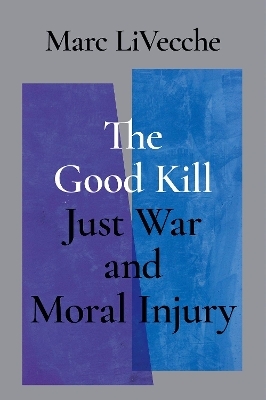
The Good Kill
Just War and Moral Injury
Seiten
2021
Oxford University Press Inc (Verlag)
978-0-19-751580-8 (ISBN)
Oxford University Press Inc (Verlag)
978-0-19-751580-8 (ISBN)
The Good Kill addresses the crisis of moral injury among warfighters from the perspective of the just war tradition. By providing a moral framework for enduring the heavy business of killing in combat, Marc LiVecche offers potential remedies to help warfighters manage the effects of killing without becoming irreparably morally injured.
War wounds the soul. It is not only the violence that warfighters suffer against them that harms, but also the violence that they do. These soul wounds have come to be known as moral injuries: psychic traumas that occur from having done or condoned that which goes against deeply held moral principles. It is not surprising that the committing of atrocities or the accidental killing of the innocent would hurt the soul of warfighters.
The problem is that many warfighters at least tacitly follow the commonplace belief that killing another human being is always wrong--it's just that sometimes, as in war, it is necessary. This paradoxical commitment makes the very business of warfighting morally injurious. This problem is also a crisis. Clinical research among combat veterans has established a link between killing in combat and moral injury and between moral injury and suicide. Our warfighters, even those who have served honorably and with the right intentions, are dying by their own hands at devastating rates--casualties not of the physical threats of war, but of the moral ones.
It does not have to be this way.
The just war tradition, a moral framework for thinking about war that flows out of our Greco-Roman and Hebraic intellectual traditions, is grounded in the basic truth that killing comes in different kinds. While some kinds of killing, like murder, are always wrong, there are other kinds of killing that are morally neutral, such as unavoidable accidents, and still other kinds that are morally permitted--even, sometimes, obligatory. The Good Kill embraces this tradition to argue for the morality of killing in justified wars. Marc LiVecche does not deny the morally bruising realities of combat, but offers potential remedies to help our warfighters manage the bruising without becoming irreparably morally injured.
War wounds the soul. It is not only the violence that warfighters suffer against them that harms, but also the violence that they do. These soul wounds have come to be known as moral injuries: psychic traumas that occur from having done or condoned that which goes against deeply held moral principles. It is not surprising that the committing of atrocities or the accidental killing of the innocent would hurt the soul of warfighters.
The problem is that many warfighters at least tacitly follow the commonplace belief that killing another human being is always wrong--it's just that sometimes, as in war, it is necessary. This paradoxical commitment makes the very business of warfighting morally injurious. This problem is also a crisis. Clinical research among combat veterans has established a link between killing in combat and moral injury and between moral injury and suicide. Our warfighters, even those who have served honorably and with the right intentions, are dying by their own hands at devastating rates--casualties not of the physical threats of war, but of the moral ones.
It does not have to be this way.
The just war tradition, a moral framework for thinking about war that flows out of our Greco-Roman and Hebraic intellectual traditions, is grounded in the basic truth that killing comes in different kinds. While some kinds of killing, like murder, are always wrong, there are other kinds of killing that are morally neutral, such as unavoidable accidents, and still other kinds that are morally permitted--even, sometimes, obligatory. The Good Kill embraces this tradition to argue for the morality of killing in justified wars. Marc LiVecche does not deny the morally bruising realities of combat, but offers potential remedies to help our warfighters manage the bruising without becoming irreparably morally injured.
Marc LiVecche is the editor-at-large for Providence: A Journal of Christianity & American Foreign Policy. He was the McDonald Visiting Scholar at the McDonald Centre for Theology, Ethics, and Public Life at Oxford University.
Acknowledgments
Forward by Rev. Timothy S. Mallard, Ph.D.
Introduction
War & the Soul
The Problem of Paradox
Neither Sin nor Paradox
Just War in the Midst of Combat (?)
The Mournful Warrior
Conclusion
Works Cited
Index
| Erscheinungsdatum | 07.07.2021 |
|---|---|
| Vorwort | Timothy S. Mallard |
| Verlagsort | New York |
| Sprache | englisch |
| Maße | 165 x 246 mm |
| Gewicht | 522 g |
| Themenwelt | Geisteswissenschaften ► Philosophie ► Ethik |
| Religion / Theologie ► Christentum ► Kirchengeschichte | |
| ISBN-10 | 0-19-751580-0 / 0197515800 |
| ISBN-13 | 978-0-19-751580-8 / 9780197515808 |
| Zustand | Neuware |
| Haben Sie eine Frage zum Produkt? |
Mehr entdecken
aus dem Bereich
aus dem Bereich
von Athanasius bis Gregor dem Großen
Buch | Softcover (2024)
C.H.Beck (Verlag)
12,00 €


